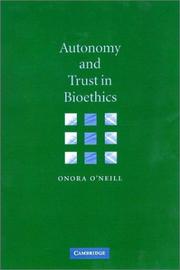| Listing 1 - 2 of 2 |
Sort by
|
Book

ISBN: 9062008119 Year: 1994 Publisher: Brugge Die Keure
Abstract | Keywords | Export | Availability | Bookmark
 Loading...
Loading...Choose an application
- Reference Manager
- EndNote
- RefWorks (Direct export to RefWorks)
Medical law --- Professional ethics. Deontology --- Insurance law --- Belgium --- 351.84*7 --- #GBIB:CBMER --- #RBIB.gift.1996.2 --- 351.82*8 --- 614.253.84 --- beroepsgeheim --- verzekering --- deontologie (plichtenleer, deontologische code, deontologische richtlijn, professionele integriteit) --- vertrouwelijkheid (vertrouwelijkheidsbeginsel) --- persoonlijke levenssfeer (privacy, bescherming van de persoonlijke levenssfeer, anonimiteit) --- recht (wetgeving, rechtspraak, rechtsbeginselen, juridische aspecten, aansprakelijkheid) --- 11.01 --- 02.01.B --- Medisch recht. Gezondheidsrecht. Wetgeving i.v.m. ziekenhuizen --- secret professionnel --- assurance --- déontologie (code de déontologie, code de conduite, code de pratiques) --- confidentialité (principe de confidentialité) --- vie privée (protection de la vie privée, anonymat) --- droit (aspects juridiques, législation, jurisprudence, principes de droit, responsabilité) --- Verzekeringsgeneeskunde ; Levensverzekering --- Verzekeringswezen ; Algemeen ; België --- 351.84*7 Medisch recht. Gezondheidsrecht. Wetgeving i.v.m. ziekenhuizen

ISBN: 0521894530 0521815401 0511020082 0511176384 0511329555 0511606257 0511157150 0511045778 9786610434213 128043421X 1107125987 9780511020087 0511030444 9780511030444 9780511045776 9780511157158 9780511606250 9780521815406 9781280434211 9780521894531 9781107125988 9780511176388 9780511329555 6610434212 Year: 2002 Publisher: Cambridge Cambridge University Press
Abstract | Keywords | Export | Availability | Bookmark
 Loading...
Loading...Choose an application
- Reference Manager
- EndNote
- RefWorks (Direct export to RefWorks)
Why has autonomy been a leading idea in philosophical writing on bioethics, and why has trust been marginal? In this important book, Onora O'Neill suggests that the conceptions of individual autonomy so widely relied on in bioethics are philosophically and ethically inadequate, and that they undermine rather than support relations of trust. She shows how Kant's non-individualistic view of autonomy provides a stronger basis for an approach to medicine, science and biotechnology, and does not marginalize untrustworthiness, while also explaining why trustworthy individuals and institutions are often undeservingly mistrusted. Her arguments are illustrated with issues raised by practices such as the use of genetic information by the police or insurers, research using human tissues, uses of new reproductive technologies, and media practices for reporting on medicine, science and technology. Autonomy and Trust in Bioethics will appeal to a wide range of readers in ethics, bioethics and related disciplines.
Medical ethics --- Bioethics --- Autonomy --- Trust --- Philosophy --- bio-ethiek (medische, biomedische ethiek, bio-ethische aspecten) --- autonomie --- individualisme --- filosofie (filosofische aspecten) --- Kantiaanse ethiek --- vertrouwelijkheid (vertrouwelijkheidsbeginsel) --- reproductief recht (recht om zich voort te planten, recht op een kind) --- genetica (genen) --- media (pers, communicatie) --- bioéthique (éthique médicale, biomédicale, aspects bioéthiques) --- philosophie (aspects philosophiques) --- éthique kantienne (kantism) --- confidentialité (principe de confidentialité) --- droit reproductif (droit de procréer, droit à la procréation, droits de la reproduction, droit à l'enfant) --- génétique (gènes) --- médias (presse, communication) --- Autonomy. --- Bioethics. --- Medical ethics. --- Trust. --- Philosophy. --- Bioethics - Philosophy. --- Trust (Psychology) --- Attitude (Psychology) --- Emotions --- Biology --- Biomedical ethics --- Life sciences --- Life sciences ethics --- Science --- Clinical ethics --- Ethics, Medical --- Health care ethics --- Medical care --- Medicine --- Professional ethics --- Nursing ethics --- Social medicine --- Independence --- Self-government --- International law --- Political science --- Sovereignty --- Moral and ethical aspects --- Arts and Humanities --- Bioethics - Philosophy --- Droit médical
| Listing 1 - 2 of 2 |
Sort by
|

 Search
Search Feedback
Feedback About UniCat
About UniCat  Help
Help News
News